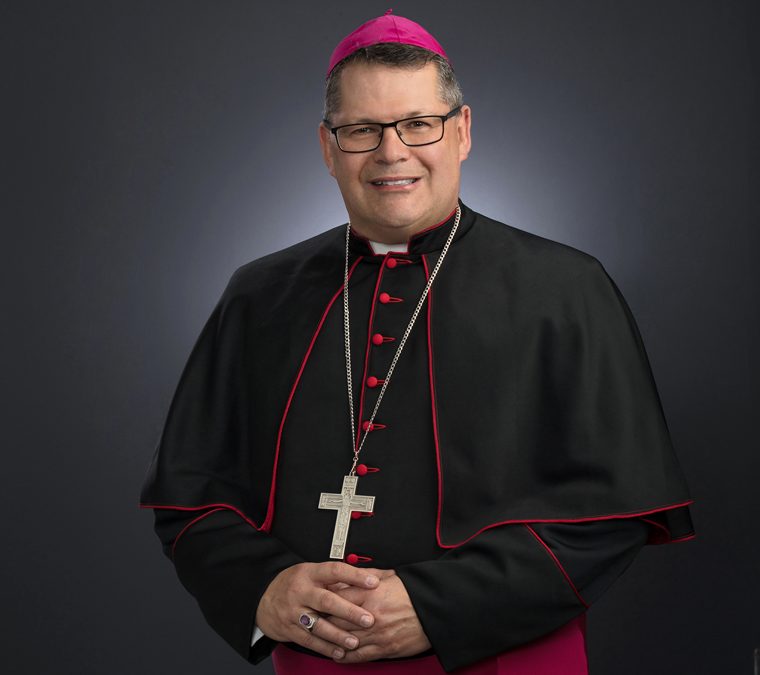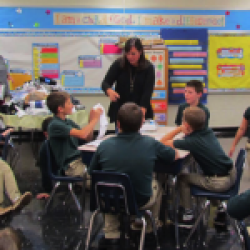“I believe in one God …”
This week we continue our exploration of the Nicene Creed which, along with the Apostles’ Creed, we use in our Eucharistic celebrations on Sundays and Solemnities. After the initial profession of “I believe,” the Creed goes on to list those beliefs. The first being “one God.”
Right away, I ask myself what this means to me, and it brings me back to my initial knowledge of the Catholic faith via the Baltimore Catechism. The very first lesson of the Baltimore Catechism is titled, “The End of Man.” The first question asked is, “Who made the world?” In other words, we did not get here by a chain of accidents, so why are we here? The answer given is, “God made the world.” This leads then to the second question, “Who is God?” And the given response of, “God is the creator of heaven and earth, of all things.”
As I previously shared with you, I am now reading a recent publication of Bishop Robert Barron, Light from Light: A Theological Reflection on the Nicene Creed (Park Ridge, IL: Word on Fire Academic, 2021). In his reflection on the initial statement of belief in the Nicene Creed, he points out that the existence of God can be known through “the light of natural reason” (p. 8). St. Paul notes this in the opening chapter of his letter to the Romans, “[God’s] eternal power and divine nature, invisible though they are, have been understood and even seen through the things he has made” (1:20). However, this knowing of the existence of God does not in Bishop Barron’s words “provide an exhaustive or adequate account of God” (p. 8). In other words, it is meant to be the beginning of a lifelong encounter and journey with our God.
This reminds me of the words of her late Majesty, Queen Elizabeth II, who at the tender age of 21 made this declaration to the citizens of the United Kingdom and the Commonwealth: “My whole life whether it be long or short shall be devoted to your service and to the service of the great imperial family to which we all belong.” In our own lives as Christians, a similar profession of faith is called for since we, too, have all become God’s anointed — “Christus — Christ — Anointed One” — on the day of our baptism. The Sacred Chrism used at the coronation of kings and queens is the same oil used at Baptism and Confirmation, along with the Ordination of Priests and Bishops.
At that moment when the crown of one’s head is anointed with the Sacred Chrism at Baptism, the following prayer is said: “Almighty God, the Father of our Lord Jesus Christ, has freed you from sin, given you new birth by water and the Holy Spirit, and joined you to his people. He now anoints you with the Chrism of salvation, so that you may remain as a member of the Body of Christ, Priest, Prophet, and King, unto eternal life.” If you and I stop and think what this moment is saying, it is really the same as the declaration of Elizabeth II: Our lives whether long or short come from God and are given for the service of God’s family.
This means, as I noted in my 2022 Pentecost letter on June 4th, that our call and formation as disciples of the Lord Jesus is a lifelong trek. Our growth in knowledge of God is something to be cultivated at all ages and in all life’s moments. Presently, the new team approach to forming disciples is being introduced in our diocese by the Diocesan Collaborative Ministry Team consisting of offices involved in faith formation, evangelization, formation for ministry, family life, youth and young adult ministry, and pastoral leadership. I encourage all parishes to have parish lay leaders and anyone interested to attend one of the information sessions happening in various parts of the Diocese this fall, so consult your Pastor or Pastoral Administrator for more information about time and place.
This Sunday, September 18th, is Catechetical Sunday in the United States. This year’s theme is, “This is my body given for you” (Lk 22:19). In the commissioning ceremony for Catechists that pastoral leaders are invited to use on that day, the following words of introduction are given: “For the pastoral activity of the Church, the cooperation of a great many people is needed, so that communities as well as individuals may advance to full maturity in faith and continually show forth their faith through the celebration of the liturgy, through study, and through their manner of life.” How aptly these words sum up this year’s theme and our journey to truly be a people of the Creed — a people whose profession of faith in one God is found in the life one leads.
One of the greatest challenges that believers face in the present moment is from those who hold they are a God unto themselves and believe only in me, myself and I; or who claim that God can’t be real because of what we experience in the world today. The challenge is how do you and I help them to encounter God, especially in light of “we can’t give what we don’t have.” This is why it is so important to take seriously what I consider is a “Pentecost” moment in the Diocese of Syracuse where we are being invited to grow in faith through an encounter with the living God. I want to take this opportunity to thank all who engage in the ministry of Catechesis in our Diocese; all coordinators and teachers, know of my great gratitude and appreciation for what you do.
Most especially, I want to thank Andrea Slaven, Bob Walters, Eileen Ziobrowski, Lisa Hall, Sister Laura Bufano and Danielle Cummings for their engagement in this team effort and for literally years of hard work in bringing this all together just to its starting point and now beyond it!
So as a diocesan family, we pray in particular this week: “Strengthen us with your gifts, that we may teach by word and by example the truth that comes from you.” And the people said: “Amen!”






